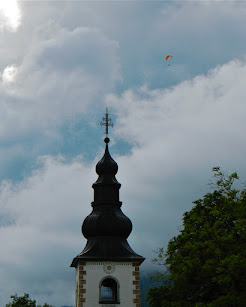Music is universal, crosses cultural, historical, and intellectual boundaries, and is grounded in mathematics. Mathematics is also universal, crosses cultural, historical, and intellectual boundaries, and is reflected in music. The interconnectedness of math and music pulsates and sings with a rhythm and harmony of its own. (Trudi Hammel Garland and Charity Vaughan Kahn, eds., Math and Music: Harmonious Connections, p.5.)
~~~~~~~~~~
Mozart's music is not, in contrast to that of Bach, a message, and not, in contrast to that of Beethoven, a personal confession. He does not reveal in his music any doctrine and certainly not himself.... Mozart does not wish to say anything: he just sings and sounds. (Karl Barth, Wolfgang Amadeus Mozart, p.37.)
~~~~~~~~~~
Of Mozart's more than sixty pieces of church music, one need think only of the C Minor Mass, the Credo Mass or the Coronation Mass, and also of the Ave verum corpus from the end of his life, which in the intense expressiveness of its melody and chromatic harmony can show how music itself can be worship. (Hans Küng, Mozart: Traces of Transcendence, Eerdmans Publishing, p.31.)
Here [at the Opera] it was that Emmy found her delight, and was introduced for the first time to the wonders of Mozart and Cimarosa. The Major's musical taste has been before alluded to, and his performances on the flute commended. But perhaps the chief pleasure he had in the operas was in watching Emmy's rapture while listening to them. A new world of love and beauty broke upon her when she was introduced to those divine compositions: this lady had the keenest and finest sensibility, and how could she be indifferent when she heard Mozart? The tender parts of Don Juan awakened in her raptures so exquisite that she would ask herself when she went to say her prayers of a night, whether it was not wicked to feel so much delight? But the Major, whom she consulted upon this head, as her theological adviser (and who himself had a pious and reverent soul), said that, for his part, every beauty of art or nature made him thankful as well as happy; and that the pleasure to be had in listening to fine music, as in looking at the stars in the sky, or at a beautiful landscape or picture, was a benefit for which we might thank Heaven as sincerely as for any other worldly blessing. (William Makepeace Thackeray, Vanity Fair, chapter 61.)
Unto Thy word so tunèd let me be,
That in each part I may thereto agree.
They sing and play the songs which best Though lov'st,
Who do and say the things which Thou approv'st.
Teach me the strain that calmeth minds enraged,
And which from vain affections doth recall.
So to the choir where angels music make
I may aspire when I this life forsake.
...May I reach
That purest heaven, be to other souls
The cup of strength in some great agony,
Enkindle generous ardor, feed pure love,
Beget the smiles that have no cruelty,
Be the sweet presence of a good diffused,
And in diffusion ever more intense!
So shall I join the choir invisible
Whose music is the gladness of the world.
thou hast bidden us to worship thee with the sound of the trumpet,
with psaltery and harp, with stringed instruments and organs,
and to be glad in thee and to shout for joy:
Help us to contrive by all means to set forth thy most worthy praise,
that our art may be tuned to thy glory.
After silence, that which comes nearest to expressing the inexpressible is music. (Aldous Huxley, "The Rest Is Silence," in Music at Night and Other Essays.)
When we listen to music we are not listening to the past, we are not listening to the future, we are listening to an expanded present. (Alan Watts, documentation unknown.)
No one imagines that a symphony is supposed to improve as it goes along, or that the whole object of playing is to reach the finale. The point of music is discovered in every moment of playing and listening to it. It is the same, I feel, with the greater part of our lives, and if we are unduly absorbed in improving them we may forget altogether to live them. (Alan Watts, documentation unknown.)
~~~~~~~~~~
~~~~~~~~~~
Even if one loves to play
One's little fiddle night and day
It's not right to broadcast it
Lest the list'ners scoff at it.
If you scratch with all your might—
Which is certainly your right—
Then bring down the windowpane
So the neighbors don't complain.
"Violins"
The violins have been gregarious
Right from the time of Stradivarius
And in the worst orchestral weather
They like to string along together
Producing tones, both high and deep,
From hair of horse on gut of sheep.
And yet to play the violin
One has to take it on the chin;
But violinists take a chance
Because they know it brings romance.
With shaking head and swaying hip
Thus handily the gypsies gyp—
Thus easily the fiddlers can
Bring life and love to any man—
And so we see, from this tirade,
Why Rome burned up when Nero played.

